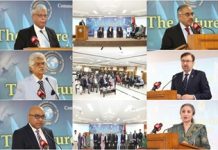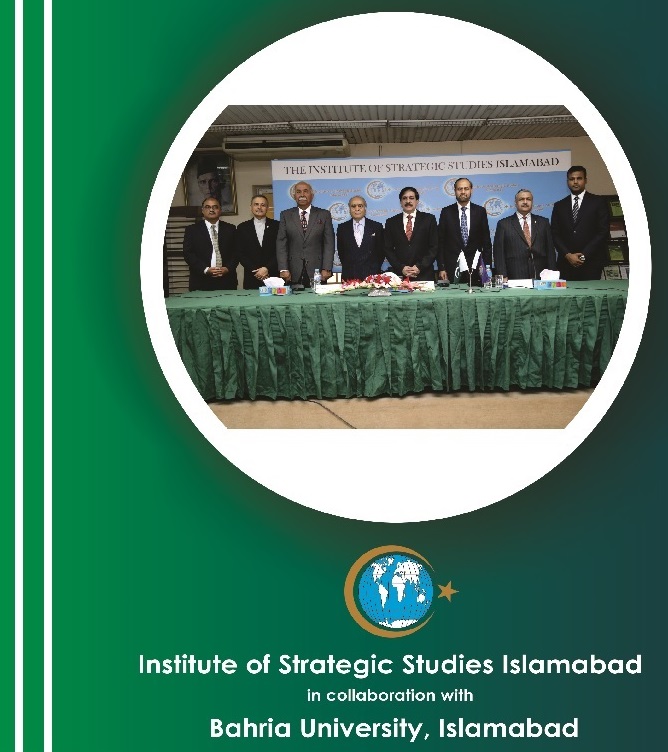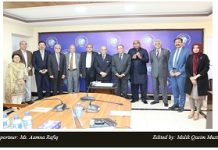CONCEPT NOTE
Indian Ocean is the third largest ocean in the world spanning over an area of 73,556,000 square kilometers that covers three continents. The ocean serves as a connecting route between the Pacific and Atlantic Oceans. Important international choke points like the Strait of Hormuz, Bab el Mandeb, Horn of Africa, Suez Canal via Red Sea and Strait of Malacca add to the geopolitical significance of Indian Ocean. With known reserves of over 65% of world oil and 35% of the world gas in the littoral states, Indian Ocean is the epicenter of maritime economy and military presence of the world. The American, British, Russian, Chinese, Indian and Pakistani navies maintain a strong military presence which highlights the importance of the Indian Ocean rim.
Pakistan, located at the center of Indian Ocean is an important littoral state which carries out more than 95% of its trade through the sea via its ports at Karachi, Qasim and Gwadar. Pakistan also utilizes its 290,000 sq km of Exclusive Economic Zone and Continental Shelf for numerous purposes including, fishing, mining, exploration and marine research. Over 15 million barrels of crude oil is shipped right across the Pakistani coast from the Gulf States daily through the Persian Gulf. Pakistan also provides the shortest sea access to Afghanistan, Central Asian States and China. This adds not only to the importance of Maritime Economy potential of Pakistan, but also highlights its geo-strategic and geo-military significance.
Realizing the importance of maritime affairs and its significance towards the national security, Pakistan has recently changed the nomenclature of Ministry of Ports and Shipping to Ministry of Maritime Affairs. Knowing how much Pakistan can capitalize by extending its Exclusive Economic Zone (EEZ) from 100 nautical miles to 200 nautical miles from the baseline, the 1976 Maritimes Zones Act (MZA) was passed by the Pakistani government of the time. Later on, in May 2015, Pakistan extended its Continental Shelf to 350 nautical miles under the ambit of UN Commission for Limits of the Continental Shelf (UNCLCS). However, MZA is losing its relevance with every passing year as we have failed to amend the Act periodically. Despite ratifying the 1982 United Nations Law of Sea Convention (UNLOSC) in 1997, the negligence of not incorporating it into our local legislation has resulted in losing a number of international privileges such as benefit sharing and commercial entitlements. This has heavily dented the Pakistani maritime economy. Also, the lack of oceanographers and “blue jobs” in the country and not enough resources to explore the ocean has prevented Pakistan from exploring its maritime potential to the fullest. A revision of MZA is required in line with the international law and the incorporation of Pakistan Maritime Security Agency Act 1994 into one comprehensive law. This would allow Pakistan to expand its area of influence at the sea.
With the anticipated growth of shipping from 638,307 active vessels to double by 2020 worldwide, Pakistan needs to invest heavily on its maritime economy and maritime transportation capabilities. The local shipping industry too has not performed well over the past few years and it is imperative to explore and implement not only new and innovative ways to buttress this industry, but also find ways to attract and retain people for the smooth operations of its vessels. The “blue jobs” hold great potential for the growing youth bulge. A sincere effort needs to be made for highlighting the importance of this industry and the benefits it can reap for the country.
Given the right focus, maritime economy can play a vital role in supporting the country’s economy. The Institute of Strategic Studies in collaboration with Bahria University organized a one-day conference on “Maritime Economy and the Geopolitics of the Indian Ocean Rim” on February 22, 2018. The aim of this conference was to look into the challenges, plausible options and recommendations for Pakistan in order to promote a new momentum and vigor to this vital and important pillar of Pakistan’s national power.















